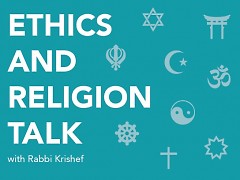Should a religious tradition be able to address any and all questions of modern life? Several times in the past months, I have sent out questions to the panel and received responses suggesting that such a question not well-suited for a column on ethics and religion. However, I believe that an ethical system should contain broad principles that can be applied to seemingly non-religious questions to give at least a hint at an answer. This week’s question is one which I and some of the panelists found difficult to answer:
Elaine writes, “Please discuss the ethics of ‘spending down’ one's assets in order to qualify for Medicaid-funded nursing home care. Some Elder-care attorneys promote their ability to help people do this. If a person has assets, but is unsure of how long they might last if long term care is needed, is this the moral, ethical way to address this?”
Fred Stella, the Pracharak (Outreach Minister) for the West Michigan Hindu Temple, responds:
“While this question certainly has merit, I find that to do it justice one must include it as part of a broader picture of how we in our society treat wealth and health. This issue is just one small example of how people of means are able to take advantage of laws that rightly or wrongly are on the books and there for the using. So along with this perhaps we should ask about the morality of sheltering income from taxes in general. And is it moral for a company to negotiate low to no taxes to come into a city if they really are going to provide significant employment? How about moving headquarters to a country that will ease the tax burden? The list is long.
“Then what about the morality of a healthcare system that can bleed a family dry in a matter of months should the ‘wrong’ illness strike? And can we sympathize with those who work so very hard during their lives hoping to leave some legacy only to see their funds wither away to nothing in their final years? Perhaps joining the rest of the civilized world and offering humane options such as universal care and caregiving might be another moral issue to discuss. On a personal note, I would gladly have my taxes raised if it meant that we could efficiently accomplish this.”
Rev. Ray Lanning, a retired minister of the Reformed Presbyterian Church of North America, responds:
“Presbyterians believe that we should ‘endeavor, by all just and lawful means, to procure, preserve, and further the wealth and outward estate of others, as well as our own;’ and it is a sin to ‘defraud’ or deprive ourselves ‘of the due use and comfort of that estate which God has given us’ (Larger Catechism, Q. 141. Given the high cost of elder care and the requirements of our current health care system, it appears wise and prudent to divert one’s assets to other uses such as payment of debts, pre-payment of funerary expenses, etc.
“One can only hope for the day when Americans awake to the fact that health care is not a commodity to be bought and sold in the marketplace. It is a duty we owe to one another as neighbors, that is, as members and citizens of the same commonwealth. It is a great injustice to turn our backs on the poor, the sick, and the elderly, and leave them to get on as best they can without our help.”
My response:
This past July, the New York Times had a very good article on exactly this question. The author shared some of the arguments both for and against the legal practice of estate planning, giving away money, putting assets in trust, or other ways of shielding assets from being counted in an effort to qualify for Medicaid.
One hand, one could argue that it is unethical to engage in Medicaid planning by spending or giving away assets because it is equivalent to attempting to qualify for a government program for the indigent by a person who has at least some assets that could pay for his or her care.
On the other hand, one could argue that a taxpayer who paid into the system, worked hard and saved something to leave as a legacy could lose everything if he or she has the misfortune to be struck with a condition that their health insurance or medicare doesn’t cover, and that if the laws creating and governing Medicaid allow for spend-downs, then it is not unethical to take advantage of the opportunity.
However, consider this before you spend down assets. Judaism believes that a person’s fate is determined by his behavior. If you choose to reduce your assets to become Medicaid eligible, you are also choosing to be dependent on taxpayer funded Medicaid-covered health care options which are not a good as private-pay or self-funded insurance options.
This column answers questions of Ethics and Religion by submitting them to a multi-faith panel of spiritual leaders in the Grand Rapids area. We’d love to hear about the ordinary ethical questions that come up on the course of your day as well as any questions of religion that you’ve wondered about. Tell us how you resolved an ethical dilemma and see how members of the Ethics and Religion Talk panel would have handled the same situation. Please send your questions to [email protected].
The Rapidian, a program of the 501(c)3 nonprofit Community Media Center, relies on the community’s support to help cover the cost of training reporters and publishing content.
We need your help.
If each of our readers and content creators who values this community platform help support its creation and maintenance, The Rapidian can continue to educate and facilitate a conversation around issues for years to come.
Please support The Rapidian and make a contribution today.
